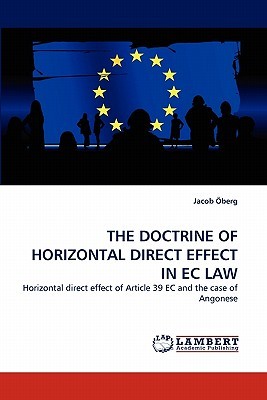
- We will send in 10–14 business days.
- Author: Jacob Berg
- Publisher: LAP Lambert Academic Publishing
- ISBN-10: 3844315063
- ISBN-13: 9783844315066
- Format: 15.2 x 22.9 x 0.5 cm, minkšti viršeliai
- Language: English
- SAVE -10% with code: EXTRA
Reviews
Description
In the year of 2000, the ECJ delivered a well-known judgement among European lawyers, Angonese, which indeed recognised horizontal direct effect of community law among private parties in the field of free movement of workers. The ECJ thus held that a job applicant could sue a private bank before the national court on the basis of the prohibition of discrimination in Article 39 of the EC Treaty. Commentators argue that this is a landmark judgment and that "Mr. Angonese will now join the annals of community law pioneers". The essential purpose of this book is to provide for an examination and critical analysis of the concept of horizontal direct effect in the field of free movement of workers, in particular to analyse in what manner the ECJ legally justified the recognition of this concept in relation to Article 39 EC.
EXTRA 10 % discount with code: EXTRA
The promotion ends in 23d.06:59:19
The discount code is valid when purchasing from 10 €. Discounts do not stack.
- Author: Jacob Berg
- Publisher: LAP Lambert Academic Publishing
- ISBN-10: 3844315063
- ISBN-13: 9783844315066
- Format: 15.2 x 22.9 x 0.5 cm, minkšti viršeliai
- Language: English English
In the year of 2000, the ECJ delivered a well-known judgement among European lawyers, Angonese, which indeed recognised horizontal direct effect of community law among private parties in the field of free movement of workers. The ECJ thus held that a job applicant could sue a private bank before the national court on the basis of the prohibition of discrimination in Article 39 of the EC Treaty. Commentators argue that this is a landmark judgment and that "Mr. Angonese will now join the annals of community law pioneers". The essential purpose of this book is to provide for an examination and critical analysis of the concept of horizontal direct effect in the field of free movement of workers, in particular to analyse in what manner the ECJ legally justified the recognition of this concept in relation to Article 39 EC.


Reviews